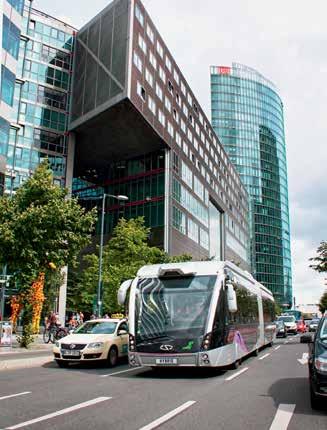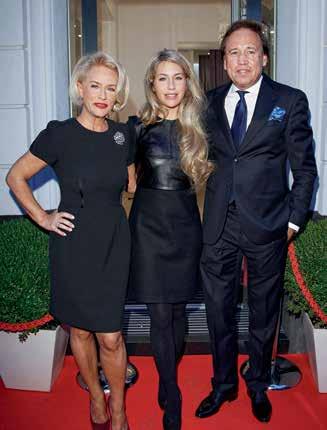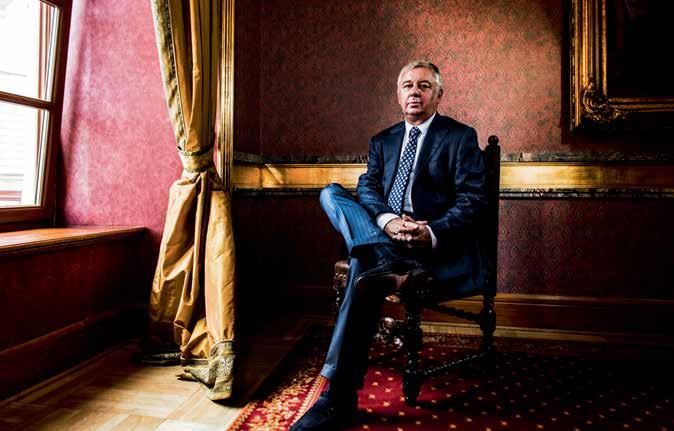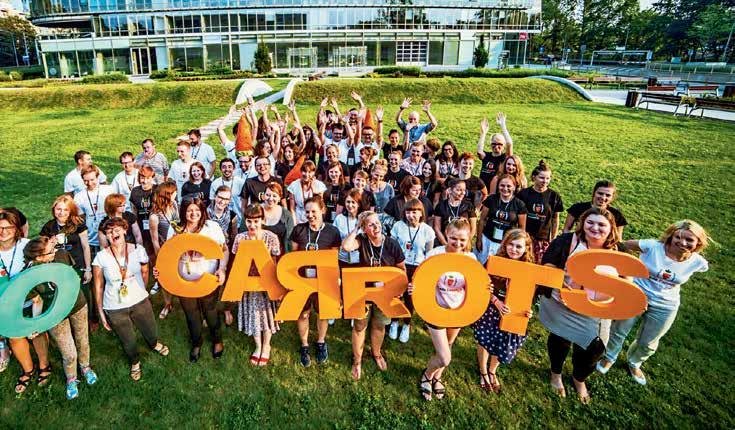
6 minute read
Business
The Witcher: One who rules them
The Witcher (bELOW), a monster hunter with special powers, is the symbol of a new Polish specialty: computer games. The three titles in the Witcher series are based on Andrzej Sapkowski's fantasy novels which enjoy Tolkien-level fame among Polish readers. The games catapulted Geralt of Rivia to worldwide fame and built the success of Warsaw-based game developer CD Projekt. The first two parts sold a total of 8 million copies, and The Witcher 3: Wild Hunt sold a record 4 million copies within the first month after release.
Advertisement
There are at least five Polish game development studios that earn tens of millions of dollars a year. Plus there are hundreds of smaller firms, at least several dozen of which have succeeded with game apps for mobile devices. One recent hit is ‘This War of Mine’ by 11 bit studios. Scooping up lots of awards, this unusual title allows players to experience war from the perspective of the civilian population rather than the soldiers fighting at the front. The production costs were recouped within 48 hours after the game debuted •
Industry

Lotos Oil refinery in GdańskRudniki, located near the Martwa Vistula river. Lotos is the largest company in Pomerania, and the secondlargest refinery in Poland after the Orlen facility in Płock •

Solaris conquers Europe
The history of Solaris, which took its name from the sciencefiction novel by Stanisław Lem, would make a fascinating novel itself except that none of it is fiction. In the 1990s, Krzysztof and Solange Olszewski practically built their firm from scratch. Today it is one of the five largest manufacturers of municipal buses in Europe, used by over 600 cities in 30 countries. The buses for one of its French customers have toilets for women drivers, those for the Alpine city of Winterthur have tinted windows because sunlight is so intense that high in the mountains, and the buses for Dubai have sand filters and separate compartments for men and women. 2014 was a record year for Solaris, it sold 1,380 buses and trolleybuses, 80% of them for export •

Shipyards: from a symbol to a business
The cranes at the Gdańsk Shipyard are a symbol of the battle against Communism. It was there that Solidarity was born – the first independent trade union in the Communist bloc.
Paradoxically, when the system changed from Communism to a free market, the shipyards themselves were a victim of the change. They lost big orders from the Soviet Union, and excess employment, low productivity and disorganization brought them to the brink of bankruptcy. But because of people’s determination, the situation today looks entirely different. The shipyard industry in Poland has reorganized along the lines followed elsewhere in Europe.
Now employment at the shipyards has grown to 32,000. Production and sales are increasing, and the companies have contracts in place for years in advance. Following the European model, they no longer produce big, simple units, but small, more expensive, specialized ships. Today the industry is a symbol of the success of Poland’s economic transformation •
A window on the world
It isn’t just a slogan. Polish window manufacturers – Drutex and Fakro – have come to dominate the European market. Both firms sell their products in Poland and abroad and are known for high quality, competitive prices, and increasingly innovative design concepts •


Wojciech and Dorota Soszyński It started with Ignacy Soszyński. Before World War II he was the owner of a factory making creams, but unfortunately not for long, because the plant was launched in 1939, just before the war broke out. The next plant was founded after the war, but that was nationalized by the Communists. Then he emigrated and ran his own cosmetics business in France and Morocco. In the early 1980s he returned to Poland, and with his son Wojciech founded a firm producing and distributing cosmetics. In 1982, young Wojciech founded his own firm, Oceanic, which became the leader of the Polish market of hypoallergenic cosmetics. Today it sells in 29 countries on four continents. He runs the company with his wife, Dorota Soszyńska, who has worked at Oceanic without a break for 33 years •

Global IT
Polish high tech is also about huge corporations with successful operations around the world. Adam Góral and Janusz Filipiak (AbOVE) stand behind the global successes of their respective companies, Asseco and Comarch. Both firms are among the 100 biggest European software producers. According to the Truffle 100 ranking, Asseco is number 6, generating revenue of over a billion euro a year. Asseco is now looking to grow beyond the European market, particularly in Asia and Africa. About 70% of its contracts are abroad, for example launching a billing system in Ethiopia or investments in Kazakhstan. Cracow-based Comarch recently advanced three spots to 45th. Its customers include the global spirits group Diageo, owner of such brands as Johnnie Walker, Smirnoff and Captain Morgan •
Technology
Beacon Valley

The science fiction future is already here in Poland – all thanks to beacons. They are tiny computers equipped with heat and motion sensors and Bluetooth, enabling them to identify persons with a smartphone or tablet within a radius of several dozen metres. Adam Jesionkiewicz and Michał Polak (AbOVE), the founders of Ifinity, believe this revolutionary solution will bring the concept of the Internet of Things to city streets. They convinced Warsaw to try a pilot project introducing beacons for navigation at the city’s centre for handicapped people so that the blind could freely move about the space without anyone’s help. It worked. Warsaw entered the Mayors Challenge 2014, a competition organized by Bloomberg Philanthropies for the most innovative urban ideas in Europe. And it won one of the five prizes. The prize of a million dollars was used for further construction of the microlocation system. The plans are to launch several thousand such points in Warsaw •

Two years ago a group of young IT specialists from near the Mazurian city of Olsztyn built a 3D printer. Even though there were already plenty of such devices around the world, their device was designed to finally conquer one of the most serious stumbling blocks to the spread of the technology: price. The Polish start-up’s printer was going to offer high quality at a price affordable even for a small architectural practice. They raised money for their product on the crowdfunding platform Kickstarter, and their Zortax printer (LEFT) proved so good that the computer giant Dell ordered 5,000 of them.
Other Polish firms have followed Zortax’s lead by developing their own increasingly refined 3D printers for both professionals and semi-amateurs. As a result, Polish producers account for 10 % of the global 3D printer market today •

Start-up Poland
There’s hardly a big city in Poland that doesn’t have several business accelerators or incubators up and running, and business angels and funds investing in start-ups. By the nature of things, many start-ups wind down practically before they start up, never taking their business beyond the conceptual stage. But quite a few of them do become serious international businesses. Brand 24, offering brand monitoring on social media, is succeeding on numerous markets, from Thailand to the United States. The voice generator Ivona was acquired by Amazon to develop its voice analysis technology. Another Polish startup, Filmaster.tv, which analyzes viewers’ tastes and recommends films to them, was swallowed up by the creators of BitTorrent for a million dollars.
And in a strong mutually supportive start-up culture, entrepreneurs help and learn from each other. That is how the Geek Girls Carrots (AbOVE) network operates, uniting, teaching and inspiring women who love high tech •










